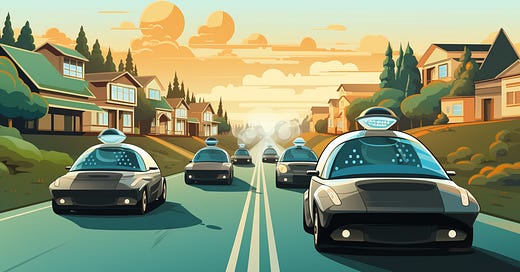Autonomous Vehicles Are Finally Here. Now What?
Time to dust off those real estate and labor market takes from 2017
You would be forgiven for ignoring the latest wave of attention surrounding autonomous vehicles. After all, AVs were the subject of a wild hype cycle half a decade ago, perhaps peaking when the IEEE declared 2017 “The Year of Autonomous Cars”. That cycle ended in disappointment as it became clear that self-driving technology was a long way from commercial viability. The media moved on, and many people wrote off self-driving cars as yet another ZIRP phenomenon.
But autonomous vehicles are slowly, methodically emerging from their trough of disillusionment. While Tesla and Uber sat at the center of the last wave of AV hype—promising more than it turned out they were capable of delivering—recent AV innovation has been led by GM’s Cruise and Alphabet’s Waymo. Both those companies have taken a more cautious, modest approach, favoring demonstrated in-situ results over proclamations and boosterism. And it’s working.
Today, autonomous taxis powered by Cruise and Waymo are commercially available in San Francisco as well as parts of Los Angeles, Austin, and Phoenix. Another dozen cities are earlier in the rollout phase, with a new market announced every month or two. While the tech isn’t done by any stretch, autonomous vehicles are likely already safer than human-piloted cars and a path to broader adoptions seems clearer than it has ever been.
Despite this, the impact that AVs could have on the real estate market has generated little attention this cycle. Perhaps real estate investors and writers feel burned by the last cycle of buzz. Perhaps they’re writing are off Cruise and Waymo’s increasing presence as yet another quirky San Francisco phenomenon. But if I’m correct and the steady hands of Google and General Motors are guiding us into an autonomous future, the impact on real estate will be tremendous both in terms of opportunities created and real estate owners left holding the bag.
So today we’re going to dig into this AV-driven future and what it means for real estate, specifically:
Why this AV wave is different than the last one;
How the world has changed from the last AV hype cycle;
Projected real estate winners and losers;
Concepts and investment strategies that make sense in a post-AV world.
So Why Is This Time Different?
I’m not going to try to convince anyone that AVs are a good thing from a public policy standpoint. I believe they are—human-powered cars kill 1.35 million people per year globally and are the leading killer of kids in the United States—but this letter is about autonomous vehicles’ impact on real estate, not their ethics.
In short, I believe this time is different because the data says it is.





